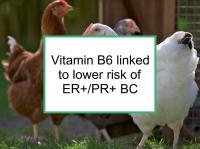Vitamin B6 (pyridoxine) has been associated with reduced risk of breast cancer, with inconsistent results. Now a new study has reported that postmenopausal women in the top fourth of circulating vitamin B6 levels have a lower risk of hormone receptor positive (ER+/PR+) breast cancer than women in the lowest fourth.
Dietary vitamin B6 and risk of breast cancer
All of the recent studies that have been performed regarding consumption of vitamin B6 in the diet have been performed in Chinese populations:
- A case-control study among Chinese women in Guangdong reported that women in the highest fourth of dietary vitamin B6 intake had a 54% lower risk of breast cancer than women in the lowest quartile. The inverse association between vitamin B6 and breast cancer risk did not differ by estrogen receptor (ER) or progesterone receptor (PR) status.
- A Taiwanese case-control study reported that women in the highest third of dietary vitamin B6 intake had a 46% lower risk of breast cancer than women in the lowest tertile. In addition, higher vitamin B6 intake was associated with a significantly lower risk of developing ER- breast tumors.
- A prospective study using data from the Shanghai Women's Health Study reported that dietary intake of most B vitamins, including vitamin B6, was not associated with breast cancer risk.
Supplemental vitamin B6 and risk of breast cancer
U.S. studies typically examine consumption of supplemental or total (diet plus supplements) vitamin B6 in association with breast cancer risk:
- A study within the Supplementation With Folate, Vitamins B6 and B12 and/or Omega-3 Fatty Acids secondary prevention trial investigated the effects of vitamin supplements (including B6) on cancer outcomes among survivors of cardiovascular disease. After 5 years of supplementation, no association was found between cancer risk or mortality and supplementation with B vitamins.
- A study using initially cancer-free participants drawn from the Women's Health Study cohort was designed to investigate the associations between plasma concentration of pyridoxal 5-phosphate (the principal active form of vitamin B6) and risk of breast cancer. Participants provided blood samples at baseline. Plasma concentrations of vitamin B6 were found to be associated with lower risk of postmenopausal breast cancer.
- A U.S. prospective study including postmenopausal women enrolled in the Cancer Prevention Study II Nutrition Cohort reported no association between total vitamin B-6 intake (from both food and supplements) and risk of breast cancer.
Latest research finds high circulating vitamin B6 linked to lower risk
The study referenced at the beginning of this news article was designed to investigate the association of prediagnostic circulating vitamin B6 with risk of breast cancer in postmenopausal women. The study included 706 breast cancer cases and 706 matched cancer-free controls in the Multiethnic Cohort in Hawaii and Southern California. Plasma concentrations of vitamin B6 were assessed with a blood draw at baseline. Circulating vitamin B6 might represent a more accurate assessment of vitamin B6 intake than an estimate based on a food and supplement questionnaire.
Women in the top fourth of vitamin B6 levels were found to have a 30% lower risk of invasive breast cancer than women in the lowest quartile. While the analysis was conducted according to hormone receptor status, the finding appeared to be limited to cases with hormone receptor positive tumors. Also, no association was found when blood was collected more than one year before diagnosis. The authors conclude that higher circulating levels of vitamin B6 are associated with lower risk of postmenopausal breast cancer.
Please see our article on what ER+/PR+ breast cancer patients and survivors should eat for more information.
